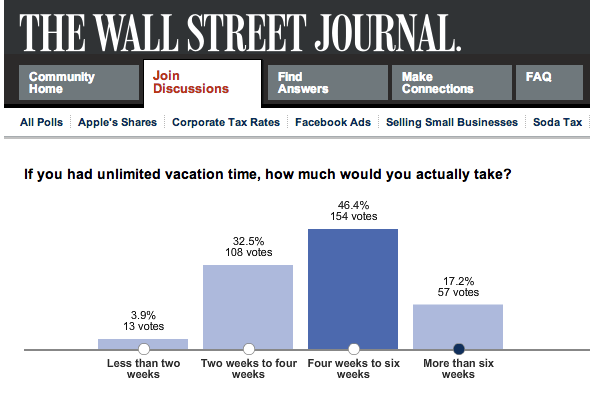How much vacation would you take if you could?
The Wall Street Journal recently ran a poll asking “If you had unlimited vacation, how much would you take? The results are shown below.
It’s a question of interest, since my next book is about WordPress.com where employees enjoy an open vacation policy.
Surprisingly almost half the respondents (46.4%) said 4-6 weeks. 17% said more than six weeks.

Read my related post exploring the question: Should Americans get more vacation?

What is interesting is that the majority said under 6 weeks. My last job I had 7 weeks PTO, but because it was a hospital setting there were no holidays and I had to use my PTO for holidays. I am rarely sick and had no problem exhausting my PTO. I would have gladly taken more had I had it.
Stating the obvious when I came to work I was more focused because my life was in order and I was happy. Those who did not have the PTO level I had or did not take it were clearly not as productive or happy, whether it was yelling at their children’s school on the phone or constantly distracted by you name it.
It’s also interesting 33% listed 4 weeks or less. I think it’s probably a commonly held belief that if you are on PTO you are lazy and not dedicated and someone is swooping in to take your position.
Unlimited vacation for professionals is a trap. It’s bad for employees and good for employers. If you are given a set amount of vacation time you can take that vacation with only a slight twinge of guilt. If there is a conflict between you and your boss about when and whether you can take that vacation, the stated policy is on your side. Unlimited vacation on the other hand calls your loyalty into question every time you pack your suitcase. Instead of a formal negotiation with your boss, it becomes an informal social negotiation with the peers who will have to cover for you.
The WSJ survey is only surprising until you actually visualize trying to take 8 weeks of vacation and the resulting interactions with your peers and your own conscience.
I have no stake in this horserace – But you make many assumptions about how both the boss and peers will respond to the ambiguity of the policy. That ambiguity can be filled with doubt and competition, or trust. A lot hinges on how compensation works and how competitive employees are.
There are plenty of companies (albeit small ones) that have unlimited vacation policies and do quite fine.
If that is indeed the case the problem is not the vacation policy.
I won’t make the point here about the relevance of online polls, but if the question is “If you had unlimited vacation, how much would you take?” … I’d think you would want to know something about what they’re taking a vacation from.
The presence of an open vacation policy at WordPress.com suggests their workplace culture is constructed in such a way that anyone who could or would abuse the policy doesn’t end up working there.
Have you heard of Valve? They have no bosses. It’s a flat corporate structure. Hey you want to ship a product? Go for it! Having never worked at Valve i’m only assuming, but for that to work they would have to hire people who suit that culture.
Is it worth mapping those people who want more leave with their level of satisfaction with their jobs and/or the workplace culture? Or how much they “Believe” in their work?
I would be curious to know the actual vacation time/year taken at WordPress and how it compare to other company without an open vacation policy.
Interesting that WordPress has an open vacation policy. I essentially run my lab that way. I don’t keep any explicit track of people’s hours or vacation days, and people who are productive can do whatever the fuck they want. Only when people are not productive do I begin to pay attention to their hours/days off.
With my team, I only look at productivity and our deadlines to customers. If we meet our targets, I don’t care how many days they take off. We have one day designated as no meetings day. Since I’m a software program manager, my definition of productivity is the ratio of complaints to positive feedback we receive from our users after a major software release. We capture lots of other metrics as part of our SDLC, but that’s the one I care about.
I looked at how many vacation days that I’ve averaged over the past 10 years and it was 20. I’ve been carrying over about 7 days a year – I receive 5 weeks plus two personal days.